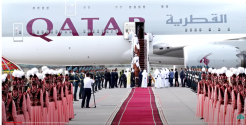Representatives from Saudi Arabia and China signed several housing and infrastructure agreements worth $1.33 billion on the sidelines of the Saudi-Chinese Business Forum hosted by Beijing on 16 August.
“[A total of] 12 agreements and memorandums of understanding were signed between the Saudi side and Chinese companies in the fields of infrastructure and financing,” Saudi Minister of Municipal and Rural Affairs and Housing Majid al-Hogail, who presided over Wednesday's forum, said in a tweet.
Although the names of the companies involved were not made public, a press release from the Saudi government revealed that Hogail met with representatives of the Chinese state-owned investment conglomerate CITIC to discuss “construction in Saudi Arabia and green housing technology.”
“These partnerships are set to foster advancements in key areas, including five focused on real estate developments, signaling a promising trajectory for the mutual growth of the Kingdom and China,” the state-run Saudi Press Agency (SPA) said on Thursday.
During his speech at the forum, Hogail stressed Riyadh’s “dedication to enhancing its partnership with China” as he spoke about several recent achievements, including the summits led by Chinese President Xi Jinping's visit to Saudi Arabia in December.
“With the construction of over 300,000 housing units across 17 Saudi cities, covering an area of over 150 million square meters., and valued at over [$26.66 billion], the kingdom holds significant investment opportunities,” Hogail emphasized.
Saudi Arabia has significantly increased its economic cooperation with China over the past few years as the kingdom moves away from Washington's sphere of influence.
In June, during the 10th Arab-China Business Conference in Riyadh, Saudi Arabia's Ministry of Investment signed $10 billion worth of investment agreements with Chinese companies. Saudi Foreign Minister Faisal bin Farhan said in a speech during the conference that China remains the largest trading partner of Arab countries, with the volume of trade exchange reaching $430 billion in 2022, up 31 percent from the previous year.
Furthermore, Saudi Aramco acquired a $3.4 billion stake in the Chinese petrochemical firm Rongsheng Petrochemical Co. Ltd last month.
The two countries are also in talks to allow exchange-traded funds (ETFs) to list on each other's stock exchanges.

